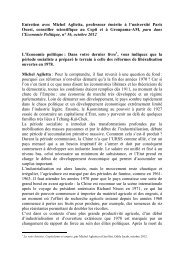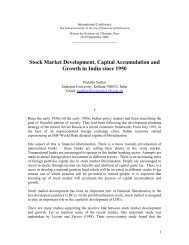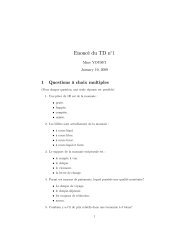Does the Entry Mode of Foreign Banks Matter for Bank ... - EconomiX
Does the Entry Mode of Foreign Banks Matter for Bank ... - EconomiX
Does the Entry Mode of Foreign Banks Matter for Bank ... - EconomiX
You also want an ePaper? Increase the reach of your titles
YUMPU automatically turns print PDFs into web optimized ePapers that Google loves.
- <strong>the</strong> government and <strong>the</strong> strategic investor, none with a majority part giving it <strong>the</strong> control<strong>of</strong> <strong>the</strong> bank (a common pattern in <strong>the</strong> early privatization period) - may not help improving<strong>the</strong> bank’s per<strong>for</strong>mance, since conflicts <strong>of</strong> interest between <strong>the</strong> shareholders mayadversely affect <strong>the</strong> development <strong>of</strong> <strong>the</strong> bank’s strategy and will give <strong>the</strong> bankmanagement <strong>the</strong> effective influence on <strong>the</strong> bank 5 . On <strong>the</strong> o<strong>the</strong>r hand, pure Initial PublicOfferings and voucher programs, which leads to diffuse ownership, is also <strong>of</strong> littlebenefits because it may also leave incumbent managers with a stronger hold on <strong>the</strong> bankthan its shareholder. However, since our definition <strong>of</strong> <strong>for</strong>eign ownership requires thatfrom 50% <strong>of</strong> <strong>the</strong> bank capital is <strong>for</strong>eign-owned, a majority <strong>of</strong> M&As in our sample don’tface <strong>the</strong>se problems as <strong>the</strong>y have a controlling strategic investor.The second factor may be <strong>the</strong> nature <strong>of</strong> <strong>the</strong> inherited problems from <strong>for</strong>mer stateownedbanks faced by M&As. Indeed, <strong>the</strong>re may be two major problems: an asset <strong>of</strong>uncertain quality with some proportion <strong>of</strong> problem loans, and an overly large staff with anon negligible fraction <strong>of</strong> those with outdated skills (Abarbanell & Bonin, 1997). Theinherited problems could also stem from <strong>the</strong> bad legacy represented by countercommercialattitudes left over from <strong>the</strong> communist era, high operating costs and aboveaveragereserves, inefficient branch network, underdeveloped in<strong>for</strong>mation technologies,and low quality clientele… (Majnoni, Shankar, & Varhegyi, 2003, p. 14). It takes time<strong>for</strong> M&As to resolve <strong>the</strong> asset quality problem by restructuring bad loans and introducingnew lending practices and procedures. In some cases, <strong>the</strong>se domestic banks acquired havehad long term relationships with traditional financially troubled industries, or <strong>the</strong> mergerand acquisition operations may have been facilitated by local authorities on condition that<strong>the</strong> new M&As maintain a certain level <strong>of</strong> financial support to <strong>the</strong>se unattractive sectors.There<strong>for</strong>e, it also takes time to reorient <strong>the</strong> loan portfolio away from <strong>the</strong>se sectors intohealthier industries, especially in <strong>the</strong> presence <strong>of</strong> local pressure. It takes time, too, toreduce <strong>the</strong> work<strong>for</strong>ce because <strong>of</strong> fear <strong>of</strong> labor action or <strong>of</strong> confrontation with <strong>the</strong> politicalbodies which have <strong>the</strong>mselves employment objectives (Abarbanell & Bonin, 1997). Wecall this adjustment process <strong>the</strong> age effect. Thus, <strong>the</strong> time it takes to get rid <strong>of</strong> <strong>the</strong>inherited problems (measured by <strong>the</strong> age <strong>of</strong> <strong>the</strong> bank) serves to measure <strong>the</strong> extent <strong>of</strong><strong>the</strong>se problems.5 See, <strong>for</strong> example, (Abarbanell & Bonin, 1997) on <strong>the</strong> case <strong>of</strong> <strong>Bank</strong> Slaski in Poland.-17-



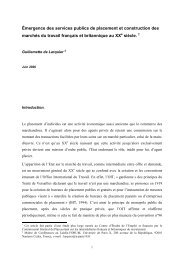
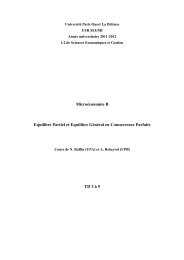

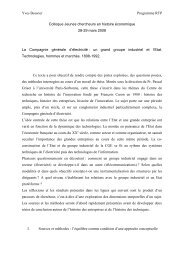

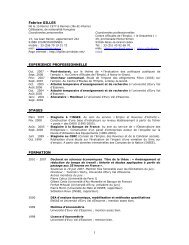
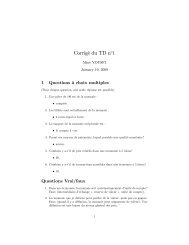
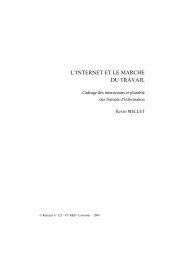
![P * 1 JTZWL_TZY OP^ Sd[Z_Sl^P^ !=m_m]Z^NmOL ... - EconomiX](https://img.yumpu.com/42226403/1/190x143/p-1-jtzwl-tzy-op-sdz-slp-m-mznmol-economix.jpg?quality=85)
